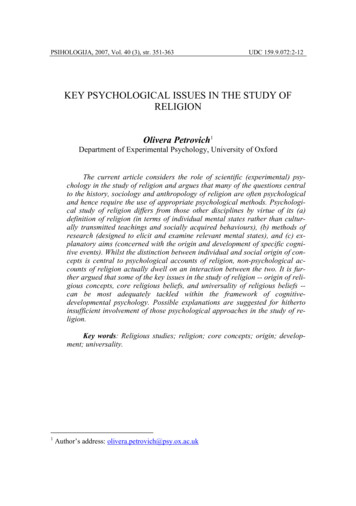
Transcription
PSIHOLOGIJA, 2007, Vol. 40 (3), str. 351-363UDC 159.9.072:2-12KEY PSYCHOLOGICAL ISSUES IN THE STUDY OFRELIGIONOlivera Petrovich1Department of Experimental Psychology, University of OxfordThe current article considers the role of scientific (experimental) psychology in the study of religion and argues that many of the questions centralto the history, sociology and anthropology of religion are often psychologicaland hence require the use of appropriate psychological methods. Psychological study of religion differs from those other disciplines by virtue of its (a)definition of religion (in terms of individual mental states rather than culturally transmitted teachings and socially acquired behaviours), (b) methods ofresearch (designed to elicit and examine relevant mental states), and (c) explanatory aims (concerned with the origin and development of specific cognitive events). Whilst the distinction between individual and social origin of concepts is central to psychological accounts of religion, non-psychological accounts of religion actually dwell on an interaction between the two. It is further argued that some of the key issues in the study of religion -- origin of religious concepts, core religious beliefs, and universality of religious beliefs -can be most adequately tackled within the framework of cognitivedevelopmental psychology. Possible explanations are suggested for hithertoinsufficient involvement of those psychological approaches in the study of religion.Key words: Religious studies; religion; core concepts; origin; development; universality.1Author’s address: olivera.petrovich@psy.ox.ac.uk
Olivera PetrovichINTRODUCTION: PSYCHOLOGY AND RELIGIOUS STUDIESThe fact that psychology is not commonly included among the disciplines ofreligious studies (e.g., Combermere, 1990) might be construed as implying thatthere are no distinctly psychological issues in the study of religion. Yet, many of thequestions discussed in the history, anthropology, or sociology of religion could onlybe fully answered by using psychological research methods. In the current article,references to psychology are made primarily from the viewpoint of scientific or experimental psychology rather than psychoanalysis, transpersonal, phenomenological or other types of psychology including any form of psychotherapy. Furthermore, within scientific psychology, the emphasis is on cognitive and developmentalpsychology, primarily because of the relevance of those approaches to the issuesaddressed in this article but, also, because of a relative neglect of these areas of psychology in religious studies compared to the approaches mentioned above.The relevance of psychology to the study of religion can be illustrated by itsimplicit presence in the works of eminent religious scholars. Eliade, for example,contends that it is the task of history of religion to arrive at “general considerationson the religious behaviour of man” (1959, p. 89), disregarding the fact that humanbehaviour as such is a topic for psychological research. Smart (1987) similarly assigns to history the essentially psychological task of identifying “recurrent patternsof religious thought [.] and experience that can be found cross-culturally” whereaspsychology, in his view, explores “timeless patterns or types of religious experience" (p. 571). Yet the only substantial difference between the historian, on the onehand, and the psychologist, on the other, is that the historian looks for “recurrentpatterns” in religious texts whilst the psychologist seeks to identify them in thethought and behaviour of actually existing persons. Needless to say, to understandreligion as a human phenomenon fully, the work of the historian and the psychologist must be seen as complementary.Sociology of religion likewise frequently implies psychological explanations.This is entirely appropriate given that any explanation of human behaviour ingroups and societies presupposes some understanding of the individual processes.For this reason, Durkheim’s view (in Morris, 1987) that religion is a culturally constructed phenomenon and thus constitutes a sociological topic rather than somethingthat can be explained by reference to psychological factors is puzzling. Althoughreligion undoubtedly is a social institution, whose many aspects can only be acquired through social life of the individual, religion is first and foremost a mentalexperience that need not have any manifest social expressions. For instance, inprayer, religious meditation, or contemplation, as distinctly religious events, theremay be no observable behaviours that could be identified as uniquely associatedwith those mental states even when they take place in the presence of other people.Psychological explanations are also present in anthropological accounts of religion, as Nisbet (1987) implies when stipulating that anthropologists locate religionin (a) psychic states, (b) ritual acts, or (c) awe of celestial bodies and terrestrial phe352
Key Psychological Issues in the Study of Religionnomena. Psychologists cannot overlook that all three sources clearly pertain to themind. Thus, to clarify the role of each, including our reasons for performing rituals,psychological methods of research are needed. Significantly, some contemporaryanthropologists (Boyer, 1994; Guthrie, 1980) acknowledge the limitations of nonpsychological theories purporting to explain origin of religion and cogently arguefor a psychological theory of religion. They recognise that the study of religion cannot advance without a contribution of psychology simply because psychologicalquestions are different from those asked in the other departments of religious studies. Consider the following examples. When we ask why religious beliefs are bothsimilar and different across cultures; whether anything in human nature can accountfor those similarities; whether people from diverse religious traditions adopt certainreligious beliefs under the same conditions; what experiences, if any, differentiateprayer from worship, and the like, in all such instances we are asking primarily psychological questions. Psychological explanations are therefore not an alternativeapproach to the study of religion but one that is fundamental and necessary. Putsimply, psychological explanations deal with the more basic units of religious phenomena (i.e., at the level of the individual) than those addressed by the other disciplines studying religion (e.g., at the level of history, culture, or social groups). Thisis not to say that psychological methods imply or necessarily lead to reductionistaccounts; rather, any complexities can be better accounted for by recognising thedifferent levels of enquiry contained within them.Psychological research can therefore make a positive and, indeed, vital contribution to religious studies by showing how the human psychological constitutionunderpins religious phenomena and why, in spite of the vast religious-cultural differences, humans from different cultures arrive at some highly similar beliefs of areligious kind. And vice versa: why, in spite of their major cognitive-psychologicalsimilarities as well as similar cultural influences, human beings often adopt differentreligious beliefs and practices. Information of this kind would, de facto, fulfil thehistorian’s ideal of identifying “recurrent patterns of religious thought” (Smart,1987) and “formulating general considerations on the religious behaviour of man”(Eliade, 1959). In contrast, studying the content of religious beliefs characteristic ofdifferent traditions or recorded in human artefacts with the aim of uncovering something about human nature (Smart, 1990) would do so only indirectly and tentatively.Our brief review of the main tasks that distinguish psychological from the historical, sociological and anthropological approaches to religion illustrates the importance of delineating clearly the questions and methods of enquiry specific to eachdiscipline. In particular, it is in the interests of constructive multidisciplinary enquiry to maintain a distinction between religious beliefs characteristic of institutions(i.e., public, such as those available in texts) and those of the individual (i.e., personal or private). Both kinds of belief are of interest and merit proper explanationbut the methods of enquiry appropriate to each kind are different and their respective findings will have different theoretical implications.353
Olivera PetrovichRELIGIOUS VERSUS PSYCHOLOGICAL DEFINITION OFRELIGIONThe confounding between psychological and non-psychological issues in religious studies undoubtedly stems from insufficiently precise definitions of the term“religion”. Two connotations of this term are particularly relevant because they imply different methods of investigation and have a direct bearing on the distinctionbetween what is taught, on the one hand, and how ordinary individuals assimilatethe material taught, on the other. According to the first connotation, “religion” (or“religious belief”) refers to a set of teachings or doctrines that make up a particularsystem of religious ideas such as, for example, Buddhism, Christianity, Islam, andother religions. Such beliefs are often formulations by the founders of particularreligious systems or reinterpretations of those formulations by later theologians.This sense of religion is doctrinal-theoretical and as such requires textual, or hermeneutic, methods of investigation. Thus, for example, to explain the beliefs of religious founders and leaders such as the Buddha, Luther, or Muhammad, scholarshave to rely on texts in order to provide coherent accounts of ideas expounded inthose texts. Mainly historians and theologians are engaged in such work. When,however, we begin to ask how human beings in general practice such structuredbeliefs and organise their social life in accordance with them, we adopt anthropological and sociological methods of investigation.The second sense of “religion” pertains to the beliefs, emotions, and behaviours of ordinary human beings, which arise in response to, or are about, some specific religious teachings and doctrines as well as from one’s experience in the worldthat might give rise to concepts of a religious kind. This sense of religion requiresmethods of research by which we can investigate directly the experience of the individual rather than the group. Put simply, if our aim is to explain the beliefs of actually existing, ordinary individuals, who are situated within Buddhist, Christian, Islamic and other religious cultures, our interests lie in the domain of psychology.Psychological definition of religion thus cannot ignore the relationship between what is taught, on the one hand, and how ordinary individuals assimilate thematerial taught, on the other; rather, such a distinction is a major concern in psychological research. In religious studies, by contrast, no corresponding distinction ismade between doctrines and traditions, on the one hand, and people’s beliefs aboutthe matters expressed in doctrines, on the other. Rather, the prevailing phenomenological definitions of religion allow textual scholars constantly to shift from onesense to another. For instance, they may start with the aim of explaining what theBuddha or Jesus or Muhammad meant in the respective texts. But in the process ofdoing so, textual scholars of religion manifestly rely on their own experience or thatof other people, whether actual or assumed, and generalise from this experience to awider population. Some degree of confounding between psychological and nonpsychological issues and procedures is understandable in view of our intrinsic inter354
Key Psychological Issues in the Study of Religionest in the nature of our own mind; nevertheless, explanatory goals require that theyshould be clearly differentiated.RELIGIOUS SCHOLARS AND PSYCHOLOGYSeeing that the nature of religious experience as such is a psychological topic,it is paradoxical that most of the thinking and writing about it has come from nonpsychologists. One of the main reasons for this anomaly is an outdated conceptionof psychology held by many scholars of religion. Three examples of such misconception may suffice. The first is a widespread notion that psychology as virtuallysynonymous with psychoanalysis. Freud and Jung are the most often cited sourcesin any literature on religion where psychological factors are discussed (e.g., Segal,1989, 2000). Yet, because psychoanalysis is concerned with affective and unconscious motives in human behaviour rather than cognitive processes, this approachcould not even in principle explain the nature of religious beliefs (i.e., cognitivemental states), notably those of a basic kind. Secondly, and closely linked to theabove, is a limited understanding of modern scientific psychology and the nature ofits methods. Accordingly, religious scholars question the possibility of objectivepsychological study of a “religious phenomenon” on the grounds that religion assuch is a subjective (i.e., mental) phenomenon (e.g., Smart, 1987). The fact is, however, that modern psychologists have been quite successful at designing methodsthat allow objective study of mental states (i.e., through experimental research andunder laboratory conditions). Because other researchers can replicate those procedures, they cannot be “subjective”. For instance, modern psychology has developedmethods for investigating abstract concepts in preverbal infants, logical inferencesin children and adults, hypothetical reasoning, development of both scientific andphilosophical abstract concepts (i.e., concepts of unobservable entities), to mentionsome of the more challenging areas of cognitive-developmental research. There is,therefore, no obstacle that necessarily precludes the use of the same methods forstudying religious concepts provided that the ontological distinction between theconcept, on the one hand, and its referent, on the other, can be maintained (Petrovich, 1994). Yet, the tendency to conflate the concept of something (i.e., mentalstate) and the concept’s referent (i.e., the thing itself) has led to the view that religion can never be explained by psychological study. Thus Eliade’s claim that psychology “misses the element of the sacred” (1959, p. 21). Whilst it is true that a religious concept refers to something non-empirical (i.e., “holy other”, “sacred” orGod), the concept thereof is an empirical event (mental state) and the conditions ofits occurrence belong in this world. Consequently, the empirical features of this concept are a matter for psychological research whilst its ontological referent (transcendent realm) is manifestly not but constitutes a topic normally pursued by theologiansand other scholars of religion.355
Olivera PetrovichPSYCHOLOGISTS AND RELIGIONThe weak interaction between scientific psychology and study of religion isonly partly explained by the misconceptions about psychology among religiousscholars. We also need to consider why experimental psychologists have tended toignore religion as a domain of human cognition. A number of factors may have contributed to this. To begin with, standard psychological education does not prepareresearchers for tackling specifically religious issues so that few psychology graduates have clear ideas for research in this domain. Further, the terms “religion” and“religious experience”, even when understood as mental states, are too broad to beseen as translatable into operational definitions (which are an essential requirementin psychological research). For instance, the term “religious experience” is commonly used in the literature to refer to conversion, prayer, mysticism, and worship,without, however, indicating any criteria in terms of which those experiences can bedifferentiated (or, what common underlying characteristic they share). Most empirical psychologists wouldn’t know where to begin when faced with such broad phenomena. Finally, the terms “religion” and “religious experience” are typically usedto refer to doctrinally committed and practising adults who declare themselves to bereligious (e.g., Brown, 1988; Beit-Hallahmi & Argyle, 1997). Those who do notmake such a declaration - children, unchurched adults, undecided - are presumed tobe non-religious. There is no doubt that study of well-defined religious groups isrelevant to psychology and considerable research involving such groups has beendone by social psychologists (e.g., Argyle & Beit-Hallahmi, 1975). But there is aclear need to account for some of the less well-defined forms of religiousness also,those that have no visible behavioural correlates and hence require methods capableof eliciting any implicit, or incipient, religious mental states. In other words, thenature of human populations considered by religious studies, on the one hand, andmodern psychology, on the other, is one of the more salient differences between thetwo approaches to the study of religion. Thus psychology presupposes that thewhole human population (i.e., its representative samples) can be compared with respect to any characteristic that can be observed or measured, and that only systematic comparisons of this kind permit generalisations. In the case of religion as a psychological variable, this implies that every living individual can be identified asmore or less capable of acquiring religion rather than being totally devoid of any ofits components. By contrast, the traditional disciplines of religious studies focus onalready selected groups (e.g., practicing Christians or Muslims) and dwell on thespecific cultural and social differences among them, thus arriving at findings of amore limited relevance to the general population.356
Key Psychological Issues in the Study of ReligionCOGNITIVE PSYCHOLOGY OF RELIGION: PROBLEMS ANDPROSPECTSTo apply the statistical model of the normal distribution to the study of religious belief requires that data should be obtained not just from those who declarethemselves to be religious but also those who may see themselves as outside thisdefinition. For people often misunderstand their position when they perform imaginary comparisons with the rest of the population. They may say that they are agnostic or even atheist yet hold the same basic views about the transcendent as thosewho consider themselves to be religious. A recent example that illustrates my pointis the novelist Jim Crace who was described by The Daily Telegraph (September,1999) as a “dogmatic, unrelenting, and hard-nosed” non-believer yet admitted thathe shared with religious individuals openness to transcendence and spiritualism. Inorder to find out if indeed most atheists and agnostics agree with religious believerson the basic idea of transcendence, we would need to examine a large section of thepopulation in order to consider it representative of the diversity of views encompassed by Crace’s assumption. Such a task is distinctly psychological in that it requires the use of proper sampling procedures; testing subjects under clearly definedand systematically controlled conditions; obtaining sufficiently large data sets; and,finally, applying appropriate statistical techniques in data analysis. The more commonly used survey is a useful technique for gathering preliminary information aboutcertain questions; however, it is not suited to finding answers to specific questions(i.e., testing hypotheses).In short, many of the problems in the study of religion mentioned above couldbe overcome by a greater involvement of cognitive as well as developmental psychology. To illustrate the relevance of those psychological approaches, we look atthree issues that have been singled out as of central importance in historical, anthropological, and sociological studies of religion yet are fundamentally psychological.These include (1) origin of religion; (2) core concepts in religion; and (3) universality of religious beliefs.(1) Origin of religion is an issue of vital importance in any attempt to explainreligious phenomena adequately. Whilst it is proper to consider how religion originated in human society or in particular geographical contexts, the more basic question is how it originates in individual human development. We simply do not havethe information needed to reconstruct reliably the earliest forms of human societyand to explain accurately how religion first appeared as a social institution. By contrast, the availability of actually existing humans of different ages and backgroundsprovides us with opportunities to investigate many important questions pertaining tothe origin of religion. The distinction between how ideas originate in individual development, on the one hand, and in human history, on the other, as pertinent to thestudy of religion is rarely made in non-psychological sources. Freud’s theory is themost widely cited “psychological” account of the origin of religion although it actu357
Olivera Petrovichally deals with how religion began in human history (Totem and Taboo), whichFreud assumed to be a pattern that replicates itself in individual development.Freud’s ideas later influenced several developmental accounts of religion in childhood (e.g., Bovet, 1928; Elkind, 1964; Piaget, 1925; Sully, 1903), all of which takefor granted his assumption that the “filial sentiment” is the source of personal religion, namely, that parents are our initial deities.A non-psychological theory of the origin of religion that seems to be consistentwith certain psychological principles is the “intellectualist” theory (Skorupski,1976). According to this theory, religious beliefs are plausible hypotheses so thateven primitive religion can be said to be rational. Modern psychology substantiallycorroborates emergence of rationality in early development, as findings about children’s scientific and philosophical theories and hypotheses indicate (e.g., Wellman& Gelman, 1998). To verify Skorupski’s intellectualist theory of religion, however,we need to test empirically a number of psychological questions, which he himselfdid not envisage but sought to explain religion as a sociological topic entirely.If it is indeed most appropriate to tackle the issue of origin of religion by examining individual development, the question arises when humans begin to acquirereligious beliefs. To answer this question adequately, our earlier distinction betweenbeliefs as doctrines, on the one hand, and beliefs as mental states of ordinary people,on the other, is of crucial importance. Doctrinal beliefs are transmitted through culture and thus need not be representative of people’s everyday (often spontaneous)religious understanding. Spontaneous (i.e., “untutored”) beliefs are of special interest in psychology because they can be triggered by some maturational (i.e., naturalor innate) mechanisms which determine how and when we acquire such beliefs (Petrovich, 2000). The distinction between innate and acquired concepts is an old question that modern psychology has inherited from philosophy and which continues tobe in the centre of modern developmental research (e.g., Elman et al., 1996; Karmiloff-Smith, 1991). Innately prepared concepts not only occur spontaneously inhuman development but are also basic or simple, unlike concepts that are transmitted through instruction. Interestingly, the relevance of innateness to religion wasnoticed by Otto (1923/1979), who argued that the first and central task of studyingreligious behaviour was to establish the development of rudimentary religious concepts, in particular that of the numinous (i.e., the holy), which task he rightly saw tobelong in psychology.In short, of all the disciplines involved in the study of religion, psychologyalone is explicitly concerned with conceptual development from childhood to adulthood and allows us to examine separately the spontaneous or natural component ofreligious thought and experience from the doctrinal or culturally transmitted one.One way of achieving this is through cross-cultural research whereby we can arriveat theories that explain different aspects of human religious disposition. In additionto the question of how people acquire religious beliefs, psychology can contribute toa better understanding of why people abandon religious beliefs or replace them withalternative beliefs. Further, psychology can ask whether the same factors cause similar changes in belief at all stages in individual development; whether the same factors are operational in all cultures, including those where religion and science havehad a pattern of interaction different from that in the West (e.g., Japan); and other358
Key Psychological Issues in the Study of Religionrelevant questions. Joint application of the historical-comparative method and comparative-psychological research would thus significantly strengthen our explanatoryframework for answering many of the perennial questions about religion as a universal phenomenon in human experience.(2) The controversy regarding the existence of any core religious beliefs orconcepts has been prominent in religious studies. Scholars from a variety of backgrounds have persuasively argued their particular stance on this issue and opposingschools of thought have emerged. There is, however, a major difference in the understanding of what constitutes “core” religious concepts in religious studies, on theone hand, and in psychology, on the other. Whilst scholars of religion debatewhether or not there are any common doctrinal beliefs across different religioustraditions, the current psychological view is that core (or foundational) concepts arethose very basic conceptual categories that underpin our learning and knowledgeacquisition in a particular domain. Examples of psychological core concepts includeobject, space, time, and quantity. Such concepts are thought to emerge spontaneously and early in development, are simple, and likely to be found in all cultures(e.g., Wellman & Gelman, 1998). Moreover, core concepts are few in number andpsychologists have so far examined mainly those that occur in the physical domain.The issue whether any concepts or beliefs constitute a core component of religionitself is a researchable question and as such ought to be verified empirically. Theongoing controversy regarding the existence of such concepts will continue as longas no distinction is made between religious beliefs of ordinary individuals, especially in their early development, and those beliefs that are recorded in religious andhistorical texts, usually as a result of a prolonged scholarly effort.(3) Universality of religious beliefs is an issue that is closely linked with thatof core beliefs and has consequently been an important topic in comparative religion. The comparative approach as a historical method aims to detect similarities anddifferences between doctrines and rituals characteristic of diverse traditions in orderto determine any universally occurring patterns of religious thought in the history ofreligious ideas. As already mentioned in this article, historical accounts includesome psychological theorising as well. In other words, when using the comparativeapproach, historians of religion do not adhere strictly to textual analysis but oftenadopt an implicitly empirical, i.e., psychological, approach. Their actual approachfluctuates between explaining the text, as a set of formalised beliefs, on the onehand, and construing a wider meaning of those beliefs for ordinary individuals inresponse to such doctrines, on the other. It is important to recognise, however, thatthe hermeneutic approach, although challenging and creative for students of religious traditions, is insufficient to show if there are any universal religious beliefs inthe human population. For texts are typically produced by sustained intellectual effort of a small number of specialists and as such need not be representative of thebeliefs of ordinary individuals. To establish whether members of the human population universally hold any particular religious beliefs, we also need methods of research that are used in cognitive and developmental psychology when dealing withlarge numbers of participants.359
Olivera PetrovichThe possibility that some religious beliefs are universal (e.g., basic belief in anon-anthropomorphic God as creator of the natural world) seems to have a strongerempirical foundation than could be inferred from religious texts (Barrett, 2001; Petrovich, 1997, 1999; 2000). Some of the initial findings of research into early religious understanding are consistent with other areas of developmental researchwhich suggest that there are cognitive universals in a number of domains of humanknowledge (e.g., R. Gelman, 1990; Spelke, 1988; Wellman & S. Gelman, 1998).Search for invariants in human religious cognition requires data from children andadults alike as well as comparisons between individuals from different cultures (Petrovich, 2000). Such evidence is relevant because it contributes towards establishingcriteria or empirical conditions under which humans show a reliable tendency tothink in terms of some basic religious categories such as God or the transcendent. Itis a mainstream psychological position that human behaviour is not infinitely variable (Broadbent, 1961) but can be reliably linked to certain empirical conditions,including those that give rise to abstract concepts where religious concepts belong.REFERENCESArgyle, M. & Beit-Hallahmi, B. (1975). The social psychology of religion. London,Routledge & Kegan Paul.Barrett, J. (2001). Do children experience God as adults do? In J. Andresen (Ed.).Religion in mind: Cognitive perspectives on religious belief, ritual, and experience. New York, Cambridge University Press.Beit-Hallahmi, B. & Argyle, M. (1997). The psychology of religious behaviour, belief and experience. London, Routledge.Bovet, P. (1928).
In the current article, references to psychology are made primarily from the viewpoint of scientific or ex-perimental psychology rather than psychoanalysis, transpersonal, phenomeno-logical or other types of psychology including any form of psychotherapy. Further-more, within scientific psychology, the emphasis is on cognitive and developmental











